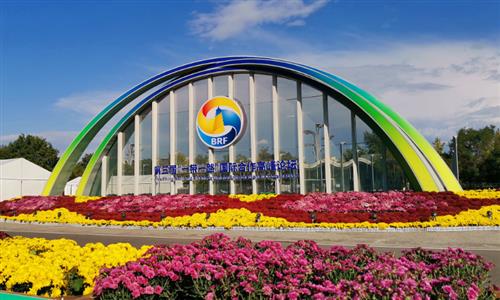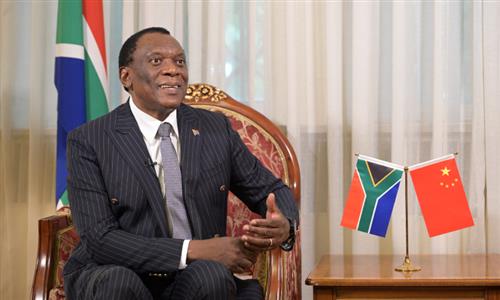
Illustration:Tang Tengfei/GT
A Chinese civil engineer in Africa who shared his thoughts on China's Belt and Road Initiative (BRI) projects went viral on social media recently. "Holding a banner and chanting a few slogans on the street about how elephants shouldn't be without tusks, you call that environmentalism? My hydropower station saves tens of thousands of tons of standard coal every day. This is environmentalism," Dr. Cao wrote.
His quips about the Western talk-the-talk soft power engagement and China's habit of "getting things done while keeping a low profile" might give many readers a good laugh. However, his observation is more of a cautionary story than anything else. When China's global infrastructure development projects are benefiting so many, why are there always rumors and denigration against the BRI?
As the BRI enters its second decade and the third Belt and Road Forum for International Cooperation approaches, it is once again attacked. "China engaging in 'debt trap diplomacy' through BRI projects" is still one of the most hyped-up claims. However, if we observe and think rationally, we'll know that such allegations lack basic factual support.
For example, an analysis by Associated Press claimed that a dozen countries most indebted to China, including Pakistan, Kenya and Sri Lanka, are fiscally collapsing because of "China's reluctance to forgive debt." But official data shows that by the first half of 2023, China only accounted for 16.2, 17.2 and 10.9 percent of foreign debt in Pakistan, Kenya and Sri Lanka respectively. Then who is the largest creditor of developing countries? Not surprisingly, Western capital. According to the 2022 statistics of the World Bank on international debt, Western financial institutions, including multilateral financial institutions and commercial creditors, accounted for nearly three-quarters of Africa's total external debt.
On debt relief, the accusation of China's non-action holds no basis. According to the World Bank, China provided 71 debt restructurings for low-income countries between 2008 and 2021, and has made the biggest contribution to implementing the G20 Debt Service Suspension Initiative. The US and some other Western countries, rather than taking actions themselves, have been pointing fingers at China for the assistance it provided, questioning China's intention while turning a blind eye to the virtuous change China has brought to those debt-hit countries.
Moreover, the fact that the network of friends to the BRI has only grown stronger over the past decade has clearly proven that the so-called debt trap narrative is self-defeating. To date, over three quarters of all countries have joined the BRI, which has generated 420,000 jobs in these countries and helped driven their economic growth. Almost all partner countries are rightly unapologetic, if not proud, about BRI cooperation when Western media warns them about joining the initiative. Also, no country would accept a deal if they knew it to be a trap. All cooperative behaviors are mutually beneficial, and the BRI is no exception.
The BRI has been depicted inaccurately or, at the very least, misinterpreted. A report filed by the Global Development Policy Center of Boston University in May 2023 summed up three loopholes of the China debt trap diplomacy narrative. First, it ignores the fact that Chinese-financed projects are driven in part by the demands of recipient countries. Second, it assumes that recipient countries have no leverage or know-how to negotiate these deals with China or could not make decisions independently. Third, it ignores the fact that Chinese financiers, like their peers in Western countries, also need to make profits and seek to avoid non-repayment. The BRI is not a solo endeavor by China, let alone an imposed demand from China, but a collaborative effort involving all stakeholders.
Economically and socially, there are plenty of reasons for the BRI to succeed, and even more reasons for the public to tell the falsehood of those unfounded narratives surrounding it. Then why are there still some people who prefer to buy those claims? Just as you could never wake up those who pretend to fall asleep, it is hard to change the mentality of those who are motivated by self-interest and rooted in ideological bias. Some people in the West regard the BRI as China's geopolitical tool to influence the political landscape of participating countries. They are extremely anxious about China's growing influence. They simply want countries to choose their initiative over China's and Western firms to out-compete the Chinese ones.
This explains why in the first three years of the BRI being proposed, the West was largely dismissive of it, saying that the projects were risky and hopeless. When the BRI became a hit in the Global South, reports and analyses became abundant with terms like "debt trap," "neo-colonialism," "geopolitical ambition" and "export of values" to smear the BRI. And today, realizing that public opinion of the Chinese initiative is too positive to shake, those skeptics have begun to look for alternatives to the BRI such as the "B3W" and the "PGII." Unfortunately, their progress and outcomes cannot match what they promised and their target countries know only too well which to choose.
"What I'm doing here in Africa for the BRI is to share the gift of development," said Dr. Cao when his team had completed another hydra-electric project in an African village. This corner of Africa can benefit from the mode of infrastructure-driven economic development. The Chinese aphorism "to get rich, build roads first" has won hearts and minds of developing countries because it tailors to their needs and it really delivers. Those looking from the lens of geopolitical rivalry might never get it.
The author is a commentator on international affairs, writing regularly for Xinhua News, Global Times, China Daily, CGTN etc. He can be reached at Xinping604@gmail.com
His quips about the Western talk-the-talk soft power engagement and China's habit of "getting things done while keeping a low profile" might give many readers a good laugh. However, his observation is more of a cautionary story than anything else. When China's global infrastructure development projects are benefiting so many, why are there always rumors and denigration against the BRI?
As the BRI enters its second decade and the third Belt and Road Forum for International Cooperation approaches, it is once again attacked. "China engaging in 'debt trap diplomacy' through BRI projects" is still one of the most hyped-up claims. However, if we observe and think rationally, we'll know that such allegations lack basic factual support.
For example, an analysis by Associated Press claimed that a dozen countries most indebted to China, including Pakistan, Kenya and Sri Lanka, are fiscally collapsing because of "China's reluctance to forgive debt." But official data shows that by the first half of 2023, China only accounted for 16.2, 17.2 and 10.9 percent of foreign debt in Pakistan, Kenya and Sri Lanka respectively. Then who is the largest creditor of developing countries? Not surprisingly, Western capital. According to the 2022 statistics of the World Bank on international debt, Western financial institutions, including multilateral financial institutions and commercial creditors, accounted for nearly three-quarters of Africa's total external debt.
On debt relief, the accusation of China's non-action holds no basis. According to the World Bank, China provided 71 debt restructurings for low-income countries between 2008 and 2021, and has made the biggest contribution to implementing the G20 Debt Service Suspension Initiative. The US and some other Western countries, rather than taking actions themselves, have been pointing fingers at China for the assistance it provided, questioning China's intention while turning a blind eye to the virtuous change China has brought to those debt-hit countries.
Moreover, the fact that the network of friends to the BRI has only grown stronger over the past decade has clearly proven that the so-called debt trap narrative is self-defeating. To date, over three quarters of all countries have joined the BRI, which has generated 420,000 jobs in these countries and helped driven their economic growth. Almost all partner countries are rightly unapologetic, if not proud, about BRI cooperation when Western media warns them about joining the initiative. Also, no country would accept a deal if they knew it to be a trap. All cooperative behaviors are mutually beneficial, and the BRI is no exception.
The BRI has been depicted inaccurately or, at the very least, misinterpreted. A report filed by the Global Development Policy Center of Boston University in May 2023 summed up three loopholes of the China debt trap diplomacy narrative. First, it ignores the fact that Chinese-financed projects are driven in part by the demands of recipient countries. Second, it assumes that recipient countries have no leverage or know-how to negotiate these deals with China or could not make decisions independently. Third, it ignores the fact that Chinese financiers, like their peers in Western countries, also need to make profits and seek to avoid non-repayment. The BRI is not a solo endeavor by China, let alone an imposed demand from China, but a collaborative effort involving all stakeholders.
Economically and socially, there are plenty of reasons for the BRI to succeed, and even more reasons for the public to tell the falsehood of those unfounded narratives surrounding it. Then why are there still some people who prefer to buy those claims? Just as you could never wake up those who pretend to fall asleep, it is hard to change the mentality of those who are motivated by self-interest and rooted in ideological bias. Some people in the West regard the BRI as China's geopolitical tool to influence the political landscape of participating countries. They are extremely anxious about China's growing influence. They simply want countries to choose their initiative over China's and Western firms to out-compete the Chinese ones.
This explains why in the first three years of the BRI being proposed, the West was largely dismissive of it, saying that the projects were risky and hopeless. When the BRI became a hit in the Global South, reports and analyses became abundant with terms like "debt trap," "neo-colonialism," "geopolitical ambition" and "export of values" to smear the BRI. And today, realizing that public opinion of the Chinese initiative is too positive to shake, those skeptics have begun to look for alternatives to the BRI such as the "B3W" and the "PGII." Unfortunately, their progress and outcomes cannot match what they promised and their target countries know only too well which to choose.
"What I'm doing here in Africa for the BRI is to share the gift of development," said Dr. Cao when his team had completed another hydra-electric project in an African village. This corner of Africa can benefit from the mode of infrastructure-driven economic development. The Chinese aphorism "to get rich, build roads first" has won hearts and minds of developing countries because it tailors to their needs and it really delivers. Those looking from the lens of geopolitical rivalry might never get it.
The author is a commentator on international affairs, writing regularly for Xinhua News, Global Times, China Daily, CGTN etc. He can be reached at Xinping604@gmail.com


